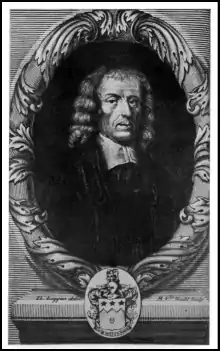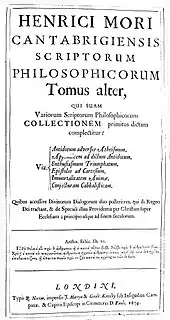Henry More
Henry More (1614 Grantham, Spojené království – 1. září 1687 Cambridge, tamtéž) byl anglický filozof, představitel cambridgeské školy platonismu. Pod vlivem J. Böhmeho a kabaly přešel od kartézské metafyziky k mysticismu.
 Portrét od Michaela Vanderguchta (podle Davida Loggana; 18. stol.) | |
| Region | Západní filosofie |
|---|---|
| Období | Novověká filosofie |
| Narození | 12. října 1614 Grantham, hrabství Lincolnshire |
| Úmrtí | 1. září 1687 (ve věku 72 let) Cambridge |
| Škola/tradice | cambridgeský platonismus |
| Oblasti zájmu | teologie, metafyzika, etika, křesťanská kabala, poezie |
| Význačné ideje | prostor jako atribut Boha |
| Alma mater | Christ’s College (Univerzita v Cambridgi) |
| Významná díla | Psychodoia Platonica, or a Platonicall Song of the Soul |
| Vlivy | Platón, atomismus, Descartes, křesťanská kabala |
| Vliv na | Isaac Newton, John Locke, Ralph Waldo Emerson, teologie |
| Některá data mohou pocházet z datové položky. | |
Byl kritizován Leibnizem za jednostrannost v otázce mechanicko-metafyzického působení přírody, neboť jak platonik odmítal materiální příčiny.
Dílo

Henrici Mori Cantabrigiensis Opera Omnia, 1679
- Observations upon Anthroposophia Theomagica and Anima Magica Abscondita by Alazonomastix Philalethes, 1650 ; in answer to Thomas Vaughan, who replied in The Man-mouse taken in a Trape.
- The Second Lash of Alazonomastix, a rejoinder to Vaughan, 1651.
- An Antidote against Atheism, or an Appeal to the Naturall Faculties of the Minde of Man, whether there be not a God, 1653 : 2nd edit. 'corrected and enlarged: With an Appendix thereunto annexed,' 1655.
- Conjectura Cabbalistica ... or a Conjectural Essay of Interpreting the Minde of Moses, according to a Threefold Cabbala: viz Literal, Philosophical, Mystical, or Divinely Moral, 1653; dedicated to Ralph Cudworth.
- Enthusiasmus Triumphatus, or a Discourse of the Nature, Causes, Kinds, and Cure of Enthusiasme; written by Philophilus Parrasiastes, and prefixed to Alazonomastix his Observations and Reply, &c., 1656.
- The Immortality of the Soul, so farre forth as it is demonstrable from the Knowledge of Nature and the Light of Reason, 1659; dedicated to Viscount Conway.
- An Explanation of the Grand Mystery of Godliness; or a True and Faithful Representation of the Everlasting Gospel of our Lord and Saviour Jesus Christ, 1660.
- A Modest Enquiry into the Mystery of Iniquity, and an Apologie, &c., 1664.
- Enchiridion Ethicum, praecipua Moralis Philosophiae Rudimenta complectens, illustrata ut plurimum Veterum Monumentis, et ad Probitatem Vitae perpetuo accommodate, 1667, 1668, 1669, 1695, 1696, and 1711.
- Divine Dialogues, containing sundry Disquisitions and Instructions concerning the Attributes of God and His Providence in the World, 1668. The most authentic edition appeared in 1713.
- An Exposition of the Seven Epistles to the Seven Churches; Together with a Brief Discourse of Idolatry, with application to the Church of Rome. The title of the latter in the volume itself is An Antidote against Idolatry, and it elicited from More in reply to attacks A brief Reply to a late Answer to Dr. Henry More his antidote against Idolatry, 1672, and An Appendix to the late Antidote against Idolatry, 1673.
- Enchiridion Metaphysicum: sive, de rebus incorporeis succincta et luculenta dissertati; pars prima, 1671, an attack on Cartesian philosophy, which he had in earlier life admired.
- Remarks upon two late ingenious Discourses [by Matthew Hale]; the one, an Essay, touching the Gravitation and non-Gravitation of Fluid Bodies; the other, touching the Torricellian Experiment, so far forth as they may concern any passages in his "Enchiridion Metaphysicum," 1676.
- Apocalypsis Apocalypseos; or the Revelation of St. John the Divine unveiled: an exposition from chapter to chapter and from verse to verse of the whole Book of the Apocalypse, 1680.
- A Plain and continued Exposition of the several Prophecies or Divine Visions of the Prophet Daniel, which have or may concern the People of God, whether Jew or Christian, &c., 1681.
- A Brief Discourse of the Real Presence of the Body and Blood of Christ in the Celebration of the Holy Eucharist; wherein the Witty Artifices of the Bishop of Meaux [Bossuet] and of Monsieur Maimbourg are obviated, whereby they would draw in the Protestants to imbrace the doctrine of Transubstantiation, 1681.
Odkazy
Reference
V tomto článku byl použit překlad textu z článku Henry More na slovenské Wikipedii.
Externí odkazy
 Obrázky, zvuky či videa k tématu Henry More na Wikimedia Commons
Obrázky, zvuky či videa k tématu Henry More na Wikimedia Commons - Seznam děl v Souborném katalogu ČR, jejichž autorem nebo tématem je Henry More
This article is issued from Wikipedia. The text is licensed under Creative Commons - Attribution - Sharealike. Additional terms may apply for the media files.